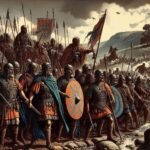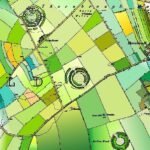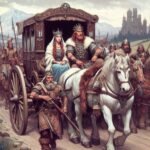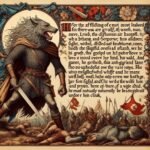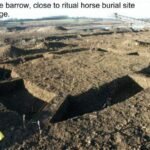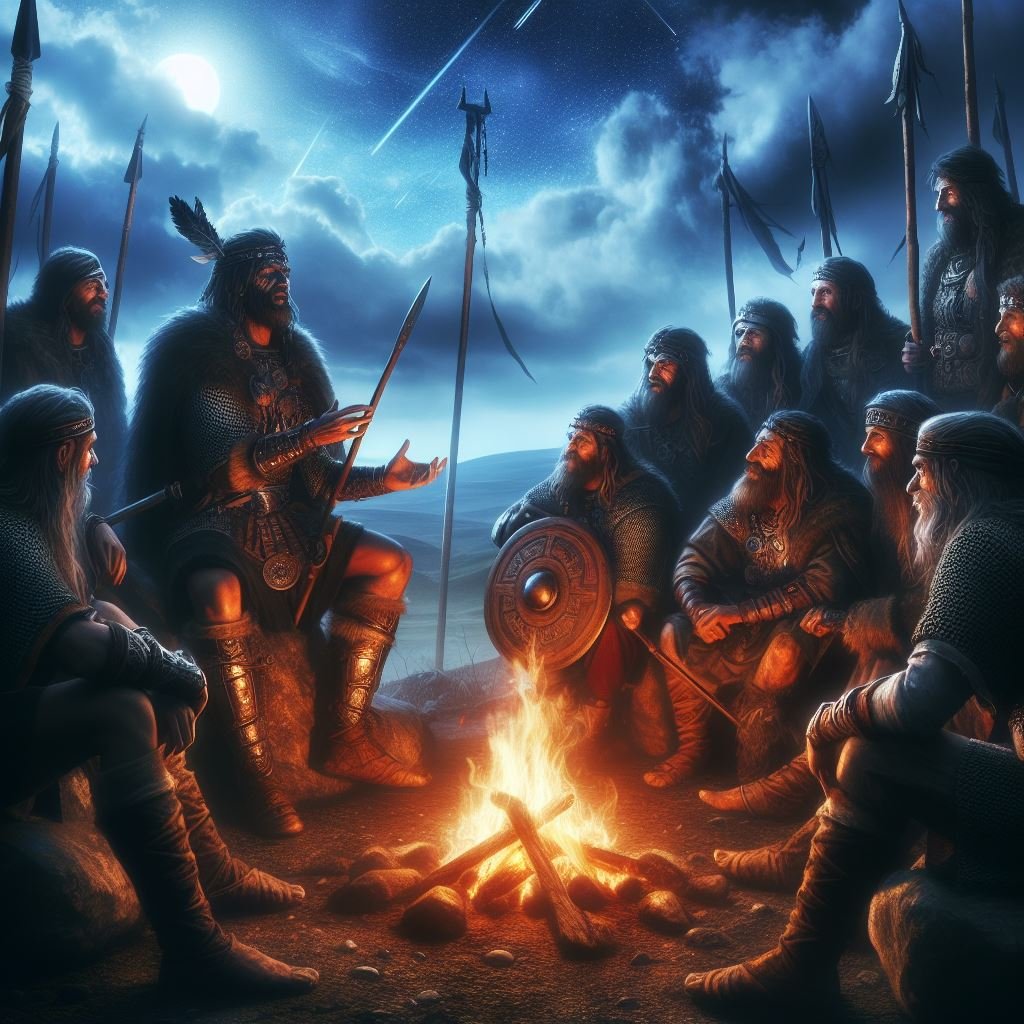
Vellocatus suggested the next instalment of his story should recount some of the background information relating to events leading up to the grand gathering at Thornborough. The date, he suggests, was somewhere around 45-55AD, but his understanding of the chronology of the period is different to ours, so right now, he can only provide an estimate. He says the great gathering itself was immediately after this period he is going to describe to us.
We knew that the Roman’s were coming. They had already landed once, when they tried to convince some of the southern tribes to collude with them in order that they could annex a significant part of Britain. We’d heard that they were after, among other things, silver. This put Brigantia within their target area.
We waited a long time for their return, and in that waiting, agreements for collective defences against the Roman’s had fallen apart. As often happened in the Celtic lands, territorial disputes arose, tribes found the excitement of conflict more appealing than the slumber of peace. And so, our grand plan for a unified defence, agreed during the time of the first invasion by the Roman’s, had long since fallen apart.
People in the south had been in various states of cross border affairs with the Roman’s. Many had, by this time, strong bonds with Roman traders, and this meant defences in the south were often highly localised, and under-manned, as warriors sworn to defend their homeland defected, or just failed to turn up.
Like a quickly spreading rash, the Roman’s expanded their influence in the south of England. Many of our greatest warriors losing their lives, for want of better support, and a better organised system of defence.
It was clear to us northern tribes that it was only a matter of time before the Roman’s were knocking on our door.
Brigantia was not a single tribal territory. It was a collection of different fiefdoms, which had many years since agreed to organise themselves collectively, and have a single leader to speak for them all. However, this was not a unified kingdom as existed elsewhere. That leader had to negotiate with all the other tribal leaders to make most decisions. It was a system of government that had worked very well for us, one that made it easy for other smaller tribes to join us, without feeling they’d made much sacrifice, other than the agreement to supply some of their resources into collective projects such as defence, and also food, for storage in case of future shortages.
During that time, some of the more strategic thinking warriors had formed their own armies out of the defeated tribes of the south. You know of Caratacus, he was one such warrior-leader. Early on in his campaign, he came to us asking for support, and we allowed many of our warriors to leave with him, in order that we could have what you might call a “proxy” army on our west flank. Providing Caratacus with warriors and food gave us the ability to fight the Roman’s in secret, outside our territory.
Caratacus’ strategy of luring the Roman’s into locations where the landscape provided his army with the right strategic advantage being one that both Cartimandua and Venutius agreed was the best strategy. His idea of mobile armies, rather than trying to defend fixed, and often poorly defended locations, was of great interest to Venutius, in his planning of Brigantia’s own defences.
The only potential flaw to Caratacus’ plan, was that he did not have sufficient food, or other resources needed to carry out an extended campaign, without the support of whichever tribal kingdom he found himself operating closest to.
It was this that had brought him to us, that first time we met him. He’d been centring his operations close to the town you call Burnley at the time, he’d been pushed northwards and had lost regular supplies from his main supporting tribe, the Durotriges. He had a supply line coming up through the land we now call Wales, and the Roman’s had pushed into southern Wales and cut this off. Of course, most of the Welsh tribes were also supporting him, but it was the Durotriges who he had his closest relationship with, and were for some items, his only supplier.
Caratacus was a great and famous warrior, known not just for his fighting skills, but also for his intellect, and for his story -telling, which you may know, we held in high regard. Stories were the life-blood of our relationship to the ancestors and gods. We had little in the way of written information, and few of our people could understand what we had. So storytelling was our way of staying linked to our roots. Tales of important past deeds, events and people being the main way we shared and retained our knowledge.
So great storytellers such as Caratacus became famous beyond their kingdoms, and, in times of peace, were often invited to other lands to tell their stories, and in so doing share insight of the culture and history of other tribes and places.
Our relationship with Caratacus, however, became less and less acceptable, due to his single minded, and often none strategic thinking when it came to the political implications of his actions, regarding Brigantia’s own relationship, both with the other tribes, and also the Roman’s. You see, overtly we had all agreed that in the short term we should not get involved in fighting with the Roman’s. At least, that was our official position. The reality, of course, was that many of the tribes were trying to help tribes such as the Iceni defend their homeland. As you will see in a future story, virtually all tribes of Britain had an oath-bond with the Iceni. So any linkage between any of the northern tribes and action against the Roman’s was to be absolutely avoided, especially while we had no unified defence strategy.
However, Caratacus had on several occasions engaged the Roman’s on Brigantian soil, and had let it be known that he preferred to engage the Roman’s in Brigantia, due to our natural landscape, and this information, caused a rift between us which, years later, would lead to Cartimandua handing over Caratacus to the Roman’s. Which is another story I will tell later.
This was the background to the gathering at Thornborough, we had watched the Roman’s consume the tribes of the south, and yet, the northern tribes were locked in indecision regarding what they were going to do when the Roman’s arrived. Now, they were indeed knocking on our door, sending patrol’s deep into our territories. The gathering at Thornborough was a last ditch attempt to agree some form of unified strategy, which we Brigantian’s were convinced, was the only viable option for defence.


